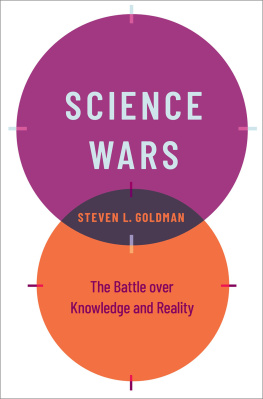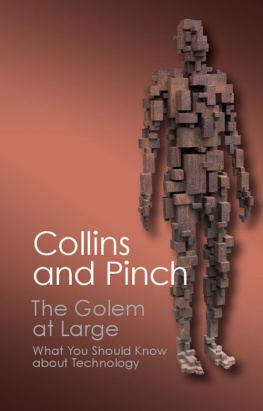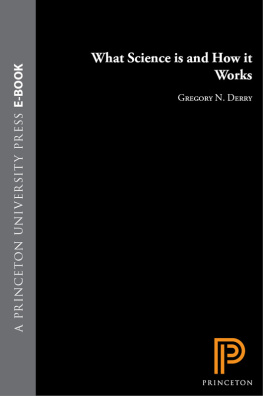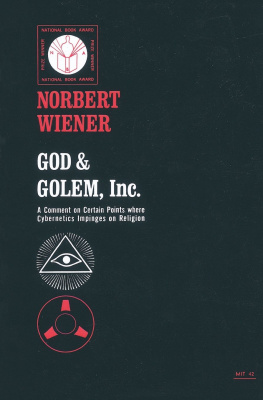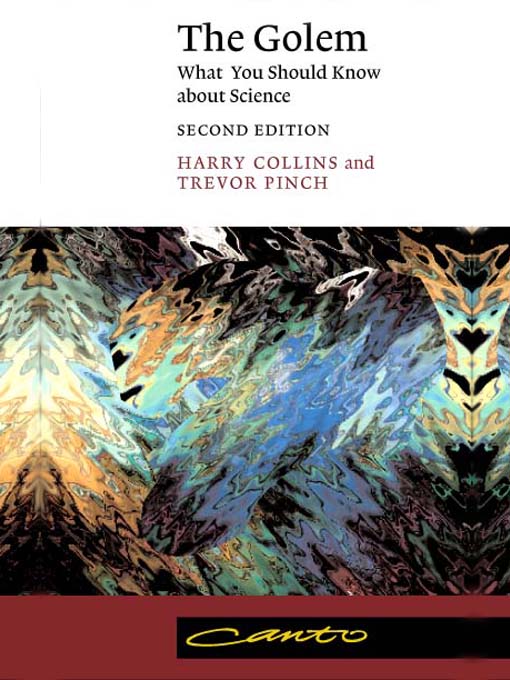The Golem: what you should know about science
The Golem presents a view of science as fallible and untidy, a matter of craft rather than logic. To do this it examines a series of experiments, some famous, such as the proofs of relativity theory, and some not so famous. In each case it shows that scientific certainties do not come from experimental method, but from the way ambiguous results were interpreted.
To explain science the authors display science. Readers should prepare themselves to learn two things: a little of science of the science of relativity, of the centre of the sun, of cosmic forces, of the brains of worms and rats, of the invention of germs, of cold fusion, and of lizards sex lives and a lot about science how experiments are really done and how scientific conclusions are reached. The essential fallibility of even so called crucial experiments is displayed.
THE GOLEM
what you should know about science
HARRY COLLINS
Distinguished Research Professor of Sociology and Director of KES,
The Centre for the Study of Knowledge, Expertise and Science,
Cardiff University
TREVOR PINCH
Professor in the Department of Science and Technology Studies at Cornell University
CAMBRIDGE
UNIVERSITY PRESS
Contents
Tothe memory of
SIDNEY COLLINS
and
forJOAN PINCH
Preface to second edition
The Golem has attracted many reviews and much comment. In particular, the chapter on the foundation of relativity has given rise to a long debate which included a three-day workshop in which scientists, historians and sociologists met to discuss the history of relativity and its significance for The Golem. What we learned from the criticisms and the discussions has been incorporated in this new edition.
There is no doubt that, from the scientists point of view, the original text had its faults. We have corrected these and all such changes are detailed at the end of the new Afterword. The main text has probably changed less than our scientist critics would have liked and the larger part of the Afterword is taken up with explaining why: We examine each serious criticism, either accepting it and making a change or putting the sociologist/historians point of view. We have found the discussions enormously to our benefit even where the scientists and ourselves were unable to reach agreement.
From our point of view, one of the greatest benefits of writing The Golem has been the discovery that scientists and social scientists can discuss the issues in a register more familiar to academics than to religious zealots. As a result each of us has been able to learn from the other though this does not mean we agree about everything.
The new Afterword is a little more technical than the main body of the book but we recommend it to those with a special interest in the debates that have taken place in recent years between scientists and social scientists or in the foundations of relativity.
For the work and comments which led to the existence of this new edition and new Afterword we thank the scientists Kurt Gottfried and David Mermin, and the social scientists and historians Clark Glymour, Arkady Plotnitsky, Simon Schaffer and Richard Staley. Klaus Hentschel and Skuli Sigurdsson were also involved at one remove. Nevertheless, in so far as the new edition still contains mistakes and infelicities, responsibility cannot be assigned to the above named.
Finally, we have changed our sub-title. The original sub-title was What everyone should know about science, but much of the criticism seemed to be directed at a book which we did not write called Everything everyone should know about science. We have said many times that we are concerned with the sub-set of controversial science because it fulfils a special role, and that is why we do not go on about what science has or has not contributed to the personal computer or the aeroplane at 30,000 feet. We do not think the book suffers unduly from this omission because there are already dozens of articles, speeches and books produced every year that set out the benefits of day-to-day science. We have also repeated that we see our book as mainly of benefit to the citizen and the novice, not the experienced scientist at the research front, but this is another message that has not been heard. Therefore we have changed the sub-title to the less general What you should know about science; it means the same thing but it sounds less inclusive.
We might also mention that Cambridge University Press has just published a second volume of the series under the title The Golem at Large: What You Should Know about Technology. That volume discusses the science and technology that comes directly to public attention, from the Patriot missile in the Gulf War to cures for AIDS.
Cardiff University
Cornell University
Autumn 1997
Preface to first Canto edition
In the short time since The Golem was first published, it has received a number of reviews. This gives us the opportunity to clear up a source of misunderstanding. The Golem is not meant to be statistically representative of the ordinary science that is done every day in laboratories throughout the world. On the contrary, most science is uncontroversial. Thus, as an introduction to the day-to-day world of science for scientists, the book would be misleading; the average scientist would be lucky indeed (or unlucky!) to be personally involved in the kind of excitement represented here. In spite of this, as we suggest, citizens as citizens need understand only controversial science. One reviewer argues: it is quite easy to think of political decisions with a scientific side to them where the science is non-controversial and offers as an example the effect on medical institutions of the development of a predictive test for Huntingdons disease. But if the science is non-controversial, why do those running the medical institutions need to understand the deep nature of the science that gave rise to the results? If the test is uncontroversially valid they can make their decisions without understanding how agreement about the test was reached. Thus, while thanking our reviewers for the many generous comments about the importance, the informativeness, and they style of the book, we stand by our claim that For citizens who want to take part in the democratic processes of a technological society, all the science they need to know about is controversial. For this purpose, The Golem represents science properly.
Although the book is primarily aimed at the citizen, there are, as we explain in the text, perhaps, three lessons for scientists as scientists to take from The Golem. Firstly, the beginning researcher, such as the doctoral student, should be prepared for the untidiness of experiment revealed in these pages; that is a universal phenomenon. Secondly, those who may be put off a scientific career because of its cold, impersonal, automaton-like, precision, may take comfort in the discovery that it has a warm, everyday, exciting, argumentative aspect, just like the arts or social sciences. Thirdly, there is an unfortunate tendency these days for scientists writing for a popular audience to compare themselves and their subject with God. The final lesson is that science is less of a God more of a golem.
Bath University
Cornell University
January 1994
Preface and acknowledgements



